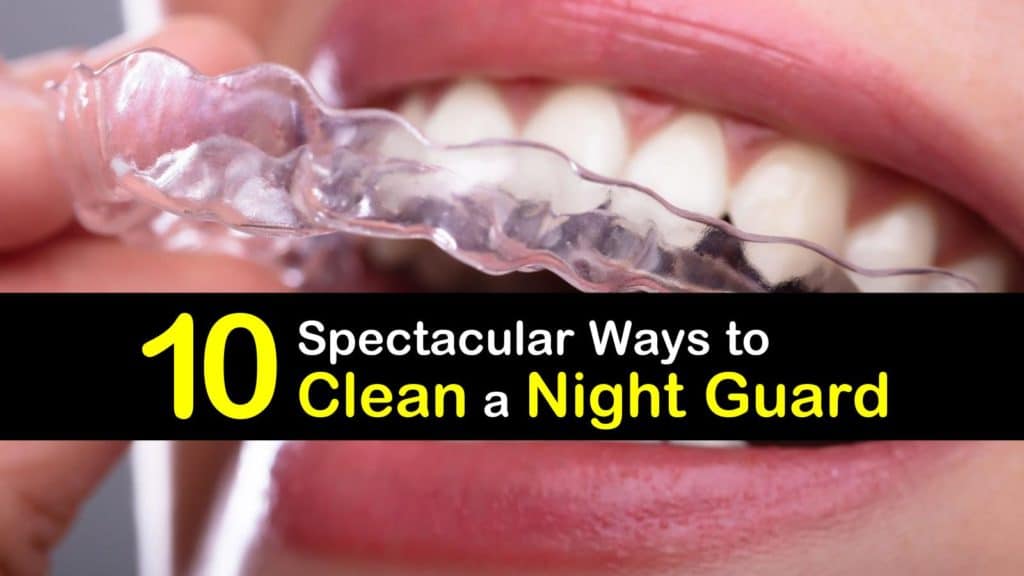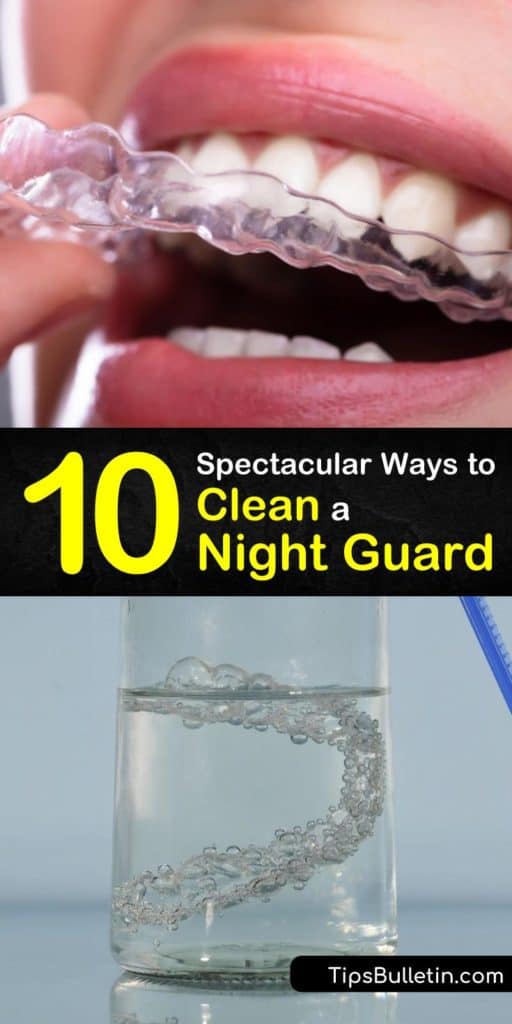Night guards are an essential oral appliance used to protect teeth from clenching and teeth grinding. The only way for a night guard to work correctly is to learn how to clean a night guard properly. Correct night guard care is essential to avoid stains and bacterial growth.
When a dentist suspects grinding or clenching, many suggest using a night guard to prevent future damage. Proper oral health requires that you learn how to remove plaque from a night guard and correct daily care. Listen to your dentist, who has great suggestions for cleaning a night guard and other oral appliances.
Failing to keep your mouth guard clean is dangerous to your health. Not only does plaque build up on the guard, but mold growth occurs when night guard care is lacking. Mold leads to various health difficulties, especially when inside your mouth. Luckily, caring for a night guard isn’t hard to figure out. Everyone can learn how to clean a night guard, so keep reading to figure out all the ins and outs of proper care.

- Easy Ways to Clean a Night Guard
- Always Rinse with Cool Water in the Morning
- The Best Way to Clean a Night Guard is with a Toothbrush
- Cleaning a Night Guard Always Involves Air Drying
- How to Clean a Night Guard with Denture Cleaner
- Use a Weekly Cleaning Tablet
- Mouthwash Cleans Night Guards
- Try Cleaning Night Guards with Hydrogen Peroxide
- Use Vinegar to Eradicate Calcium Build Up
- Baking Soda Takes off Heavy Residue
- Bleach May be Used for Mold
- Don't Forget to Clean the Night Guard Case
- Bring Your Night Guard to All Dental Visits
Easy Ways to Clean a Night Guard
Everyone wants their night guard clean, but what does cleaning a night guard involve? Don’t grab your favorite toothpaste and scrub away to kill off germs. Instead, take a look at these tips to learn proper attention and avoid damaging your mouth guard.
Always Rinse with Cool Water in the Morning
When you wake up in the morning, remove your night guard. Rinsing under cool water is essential because it removes saliva. Rinsing is also one way to remove plaque from a night guard.
Make rinsing part of your daily routine. Failing to rinse leads to debris getting stuck inside, and that causes mold growth.
Not cleaning your guard daily leads to various problems in your mouth, such as plaque build-up, bad breath, infections, discoloration of the guard, mold, mildew, and more.
Never put your dental night guard in a dishwasher. The high temperatures warp and ruin guards. Also, never use boiling hot water; the same damage results.
The Best Way to Clean a Night Guard is with a Toothbrush
The best way to clean a night guard is to brush it with your toothbrush gently after rinsing. Avoid using abrasive toothpaste because they damage night guards and cause quicker degradation. It’s costly to replace night guards frequently.

Dentists recommend that you skip the toothpaste entirely. Brush the guard with cool water, getting into all of the cracks and crevices.
It’s safe to wash with mild dish soap and water, but never use hot water because it can permanently damage your dental night guard’s fit.
Cleaning a Night Guard Always Involves Air Drying
Make sure to air dry completely before storing your night guard. Keep a clean towel or another clean surface option near your sink; you don’t want to expose it to any bacteria. Expect to wait 30 minutes before moving to storage.
How to Clean a Night Guard with Denture Cleaner
Head to the store and find a denture cleaner. These are safe for mouth guards as well as dentures. Each type of denture cleaner works differently. Some are soaps, and some are cleaning tablets. Ask your dentist for a recommendation.
Use a Weekly Cleaning Tablet
Night guards are vulnerable to bacterial growth without proper care. Plan to deep clean your night guard weekly as part of your routine to get rid of bad breath.
One way to deep clean a night guard is to use dissolvable cleaning tablets. To remove plaque from dentures or your mouth guard, put the appliance into a bowl or cup along with warm water and a cleaning tablet.
After soaking, gently scrub with a toothbrush to remove plaque from a night guard that the cleaning tablets loosened.
Mouthwash Cleans Night Guards
Another way to clean your dental night guard is to use a capful of mouthwash and pour it into a glass. Add the mouth guard and dilute with water. Allow the guard to soak for a minimum of 30 minutes.
After soaking, rinse it with clean, cool water and let air dry before moving to the storage container. Never soak your mouth guard longer than one hour.
Try Cleaning Night Guards with Hydrogen Peroxide
Another way to deep clean a night guard is to use a mixture of white vinegar and hydrogen peroxide.
For this homemade night guard cleaner, fill a cup with distilled white vinegar and soak for 30 minutes before rinsing well. Then, soak the night guard in a cup of hydrogen peroxide for an 30 additional minutes. Rinse with warm water and let the guard dry entirely before putting it in the storage case.
Use Vinegar to Eradicate Calcium Build Up
If white deposits from calcium build up on your guard, soak your retainer or mouthguard in a mixture of one cup of white vinegar and three cups of water. Let this soak for 15-30 minutes.
After soaking, gently scrub with a soft toothbrush to remove the calcium. Rinse with cool or warm water. If you use white vinegar and hydrogen peroxide as part of your weekly deep clean, calcium build up shouldn’t be a problem.
Use this popular remedy as a homemade denture cleaner or to clean your nightguard, too.
Baking Soda Takes off Heavy Residue
In most cases, cleaning your mouthguard with dish soap or antibacterial soap is all that’s needed. If you notice heavy residue build-up on your mouthguard, a safe alternative is baking soda and a toothbrush. Use it to clean dentures, too.
Be careful when using baking soda because it is abrasive and might lead to surface scratches. Scratches don’t seem like a big deal, but they lead to bacterial build-up and stains.
Wait to use baking soda until absolutely necessary, like when you notice smells or discoloration. Soak your guard in a water and baking soda solution for 30 minutes.
Another option is to make a paste with water and baking soda, using a toothbrush to gently scrub the guard. Always rinse your night guard and let it air dry.
Bleach May be Used for Mold
Before using bleach, read the instructions given by your dentist or the mouthguard manufacturer. Some recommend bleach only in the presence of mold, but others tell you never to use bleach. Failing to follow the instructions void warranties, so read first.
Finding black, green, or brown spots on your oral appliance is horrifying, but it happens when not cleaned or stored correctly. When mold is present, you have to get rid of it before using the guard again.
Mold is a living organism that loves warm, wet, humid places, such as your mouth or a storage case still damp from cleaning. Thorough cleaning prevents build-up, but everyone makes mistakes. If you find mold, here’s what to do.
Dilute household bleach in a bowl or glass to a ratio of 1:10. Soak the dental night guard for 30 minutes and brush with cool or lukewarm water. Rinse thoroughly.
Bleach is too harsh to use daily and will degrade the materials. It is safe to use infrequently when deep cleaning. Mold is more damaging to you and the oral appliance than the bleach.
Don’t Forget to Clean the Night Guard Case
Most orthodontists provide you with a ventilated case when you receive your guard. Cases keep them clean and germ-free. Improperly cleaned storage containers cause sickness.
Keep the case clean by washing it every few days with dish soap. Don’t put the case in a dishwasher, even though it’s tempting. The high temperatures used by dishwashers can warp or melt the plastic.
Let the case air dry to prevent bacteria growth. Replace plastic cases every six to 12 months because plastic degrades and wears out over time.
Don’t store your case in the bathroom because extended exposure to steam and humidity in bathrooms leads to warping. Instead, keep your night guard in your bedroom on the dresser or nightstand.
Store guards away from dogs. Every year, dentists see patients who tell them that their dog ate their mouth guard. Dogs love the scent of your saliva, so be sure to keep it away from your furry friend.
Bring Your Night Guard to All Dental Visits
When you go to the dentist for your six-month cleaning visit, always bring your night guard with you. Most offices clean guards for you while also checking for signs of wear. Your dentist needs to check the fit regularly.
The best way to clean a night guard is with daily and weekly care. It’s essential for proper oral health, so don’t put off using these tricks for night guard care.
A dental night guard becomes gross quickly when not maintained properly, but avoiding those problems is simple. Remember, clean and dry is the most important mantra.

If you found these tips on how to clean a night guard helpful, be sure to share these night guard cleaning tricks with your friends on Facebook or Pinterest.